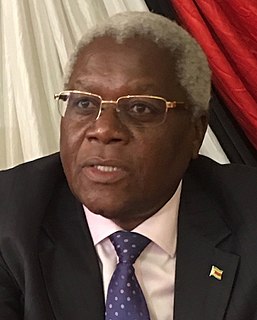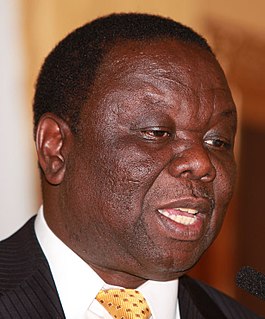Until roughly 2,000 years ago, what would become Zimbabwe was populated by ancestors of the San people. Bantu inhabitants of the region arrived and developed ceramic production in the area. A series of trading empires emerged, including the Kingdom of Mapungubwe and Kingdom of Zimbabwe. In the 1880s, the British South Africa Company began its activities in the region, leading to the colonial era in Southern Rhodesia.

Rhodesia, officially from 1970 the Republic of Rhodesia, was an unrecognised state in Southern Africa from 1965 to 1979, equivalent in territory to modern Zimbabwe. Rhodesia was the de facto successor state to the British colony of Southern Rhodesia, which had been self-governing since achieving responsible government in 1923. A landlocked nation, Rhodesia was bordered by South Africa to the south, Bechuanaland to the southwest, Zambia to the northwest, and Mozambique to the east. From 1965 to 1979, Rhodesia was one of two independent states on the African continent governed by a white minority of European descent and culture, the other being South Africa.

Zimbabwe, officially the Republic of Zimbabwe, is a landlocked country located in Southeast Africa, between the Zambezi and Limpopo Rivers, bordered by South Africa to the south, Botswana to the south-west, Zambia to the north, and Mozambique to the east. The capital and largest city is Harare. The second largest city is Bulawayo. A country of roughly 15 million people, Zimbabwe has 16 official languages, with English, Shona, and Ndebele the most common. It was once known as the "Jewel of Africa" for its great prosperity.

The economy of Zimbabwe mainly relies on its tertiary industry, which makes up to 60% of the total GDP as of 2017. Zimbabwe has the second biggest informal economy as a share of its economy, which has a score of 60.6%. Agriculture and mining largely contribute to exports. The economy of Zimbabwe grew at an average of 12% from 2009 to 2013, rendering it one of the fastest growing economies in the world. It had recovered from its negative growth from 1998 to 2008, before it slowed to 0.7% growth in 2016.

Bulawayo is the second largest city in Zimbabwe, and the largest city in the country's Matabeleland region. The city's population is disputed; the 2012 census listed it at 653,337, while the Bulawayo City Council claimed it to be about 1.2 million. Bulawayo covers an area of about 1,707 square kilometres in the western part of the country, along the Matsheumhlope River. Along with the capital Harare, Bulawayo is one of two cities in Zimbabwe that is also a province.

Joshua Mqabuko Nyongolo Nkomo was a Zimbabwean revolutionary and Matabeleland politician who served as Vice-President of Zimbabwe from 1990 until his death in 1999. He founded and led the Zimbabwe African People's Union (ZAPU) from 1961 until it merged in 1987 with Robert Mugabe's Zimbabwe African National Union (ZANU) to form ZANU–PF after an internal military crackdown that claimed more than 20 000 of ZAPU supporters.

The Rhodesian Bush War, also called the Second Chimurenga as well as the Zimbabwe War of Liberation, was a civil conflict from July 1964 to December 1979 in the unrecognised country of Rhodesia . The conflict pitted three forces against one another: the Rhodesian white minority-led government of Ian Smith ; the Zimbabwe African National Liberation Army, the military wing of Robert Mugabe's Zimbabwe African National Union; and the Zimbabwe People's Revolutionary Army of Joshua Nkomo's Zimbabwe African People's Union.
White Zimbabweans are people in Zimbabwe who are of European descent. In linguistic, cultural, and historical terms, these Zimbabweans of European ethnic origin are mostly English-speaking descendants of British settlers and a small minority of them are either Afrikaans-speaking descendants of Afrikaners from South Africa and/or those descended from Greek and Portuguese immigrants.
Operation Murambatsvina, also officially known as Operation Restore Order, was a large-scale Zimbabwean government campaign to forcibly clear slum areas across the country. The campaign started in 2005 and according to United Nations estimates has affected at least 700,000 people directly through loss of their homes or livelihood and thus could have indirectly affected around 2.4 million people. Robert Mugabe and other government officials characterised the operation as a crackdown against illegal housing and commercial activities, and as an effort to reduce the risk of the spread of infectious disease in these areas.

The Reserve Bank of Zimbabwe is the central bank of Zimbabwe headquartered in the capital city of Zimbabwe, Harare.

Arthur Guseni Oliver Mutambara is a Zimbabwean politician. He became the president of the Movement for Democratic Change (MDC) in February 2006. He has worked as a director and CEO of Africa Technology and Business Institute since September 2003. Under a September 2008 power-sharing agreement, Mutambara served in the government as one of two Deputy Prime Ministers from 2009 to 2013.

Emmerson Dambudzo Mnangagwa is a Zimbabwean revolutionist and politician who has served as President of Zimbabwe since 24 November 2017. A member of ZANU–PF and a longtime ally of former President Robert Mugabe, he held a series of cabinet portfolios and was Mugabe's Vice President until November 2017, when he was dismissed before coming to power in a coup d'état. He secured his first full term as president in the disputed 2018 general election.

The prime minister of Zimbabwe was a political office in the government of Zimbabwe that existed on two occasions. The first person to hold the position was Robert Mugabe from 1980 to 1987 following independence from the United Kingdom. He took office when Southern Rhodesia became the Republic of Zimbabwe on 18 April 1980. This position was abolished when the constitution was amended in 1987 and Mugabe became president of Zimbabwe, replacing Canaan Banana as the head of state while also remaining the head of government. The office of prime minister was restored in 2009 and held by Morgan Tsvangirai until the position was again abolished by the 2013 Constitution of Zimbabwe.
Nathan Shamuyarira was a Zimbabwean nationalist who at different times fought on behalf of and helped lead FROLIZI, ZANU, and ZAPU. He later served as the Information Minister of Zimbabwe and as the Information Secretary of ZANU PF. He was writing President Robert Mugabe's biography at the time of his death.

Didymus Noel Edwin Mutasa is a Zimbabwean politician who served as Zimbabwe's Speaker of Parliament from 1980 to 1990. Subsequently he held various ministerial posts working under President Robert Mugabe in the President's Office. He was Minister of State for Presidential Affairs from 2009 to 2014 and also served as ZANU-PF's Secretary for Administration.
Zimbabwe began experiencing a period of considerable political and economic upheaval in 1999. Opposition to President Mugabe and the ZANU-PF government grew considerably after the mid-1990s in part due to worsening economic and human rights conditions. The Movement for Democratic Change (MDC) was established in September 1999 as an opposition party founded by trade unionist Morgan Tsvangirai.

Ignatius Morgen Chiminya Chombo is a Zimbabwean politician who was Finance Minister of Zimbabwe in 2017. Previously he has served in the Cabinet of Zimbabwe as Minister of Home Affairs from 2015–17, Minister of Local Government, Public Works and Urban Development from 2000–2015.
Operation Mavhoterapapi, was a large scale Zimbabwean government campaign to punish those who supposedly voted for the Movement for Democratic Change in the 2008 presidential election rather than for ZANU-PF.

Robert Gabriel Mugabe was a Zimbabwean revolutionary and politician who served as Prime Minister of Zimbabwe from 1980 to 1987 and then as President from 1987 to 2017. He served as Leader of the Zimbabwe African National Union (ZANU) from 1975 to 1980 and led its successor political party, the ZANU – Patriotic Front (ZANU–PF), from 1980 to 2017. Ideologically an African nationalist, during the 1970s and 1980s he identified as a Marxist–Leninist, and as a socialist after the 1990s.

Morgan Richard Tsvangirai was a Zimbabwean politician who was Prime Minister of Zimbabwe from 2009 to 2013. He was President of the Movement for Democratic Change, and later the Movement for Democratic Change – Tsvangirai (MDC–T), and a key figure in the opposition to former President Robert Mugabe.













